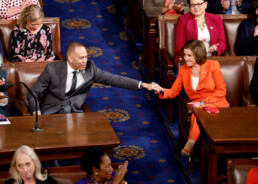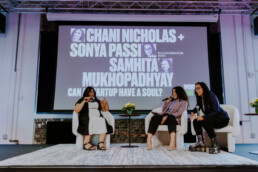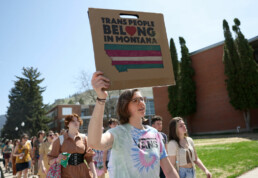"Why do people do this?"
October 27, 2023NEWS,NEWSLETTER
|
No images? Click here Good evening, Meteor readers, As we amble our way towards November (it’s RIGHT there), I am thinking of entering a season of gratitude. With the news awash with tragedy—the mass shooting in Maine, the devastation of Hurricane Otis in Acapulco, and the continuing crises in Gaza and Israel—I am more aware than ever of how often I take for granted life’s small pleasant surprises. Let’s all choose to be better about that. In today’s newsletter we look at the inadequate gun laws that made way for the Maine shooting, share our weekend reading, and hear from one of the women who first blew the whistle on AI’s biased ways. With love, Shannon Melero  WHAT'S GOING ON THE BAR WHERE PART OF WEDNESDAY'S MASS SHOOTING TOOK PLACE. (IMAGE BY SCOTT EISEN VIA GETTY IMAGES) Lewiston, Maine: It started in a bowling alley on Wednesday night. Officials say that around 7 p.m., a gunman entered Sparetime Recreation and started firing rounds from an “assault-style weapon.” He eventually fled the scene and drove to a local bar to continue the shooting spree. So far, 18 people have been confirmed dead, with 13 injured. One of the wounded, a 10-year-old named Zoey, who was there with her youth bowling league, told a local news station, “I had never thought I’d grow up and get a bullet in my leg. And it’s just like, why? Why do people do this?” The simplest answer to Zoey’s question is: because they can. The suspected gunman, Robert Card, is a firearms instructor and a U.S. Army Reservist. As early as this summer, military officials had “concerns” about Card, and later reported him for erratic behavior while supporting summer training for cadets at West Point. Card was later admitted to a mental health facility, where he claimed he’d been “hearing voices and threats to shoot up” West Point. Despite all of this, Card still had access to firearms. That’s because in Maine—where gun laws are some of the most obscenely lax in the country—just about anyone can legally acquire a firearm. There are weak background check laws, no waiting periods, and no red flag laws, which prohibit gun purchases or possession for anybody who shows signs of being a threat to themselves or others. (Hearing voices and threats to shoot up West Point would count.) Not only that, Maine has had a “permitless carry law” since 2015. This means that any person over the age of 21 “or at least 18 and active duty or honorably discharged military” who owns a gun can carry “loaded, concealed handguns in public without a permit or background checks.” It should not take a mass shooting to enact the most basic gun safety laws. It’s too late for the 18 victims and their families, but it isn’t too late for Zoey, or the rest of us. You can learn more about safety initiatives in Maine from The Maine Gun Safety Coalition and check the laws in your state at Everytown for Gun Safety. AND:
 “The Past Dwells in our Datasets”Can AI ever be unbiased? MIT scholar Dr. Joy Buolamwini has some answersBY REBECCA CARROLL  (IMAGE BY PARAS GRIFFIN VIA GETTY IMAGES) In the celebrated Steven Spielberg movie A.I., set in the 22nd century, scientists create an android boy capable of experiencing human emotions. The film (and its all-white cast) try hard to convince us that at its best, artificial intelligence can learn to love. That was 2001. More than 20 years later, we’re discovering that AI—which now mostly takes the form of computer programs rather than robots—often actually reflects real people’s worst biases. And those embedded prejudices are doing a lot of harm, argues computer scientist, digital activist, and “poet of code” Dr. Joy Buolamwini in her new book, Unmasking AI: My Mission to Protect What is Human in the World. Born in Edmonton, Canada, Dr. Buolamwini spent her early years in Ghana before moving with her artist mother and scientist father to Mississippi when she was four. Just five years later, she saw an MIT-made robot called Kismet on a PBS science program—and decided on the spot that she was going to attend MIT to study robotics. But, once at MIT, she quickly realized her calling was much bigger. As she learned about the ways racial, gender and ableist biases had crept into facial recognition technology, she launched the Algorithmic Justice League, an organization that uses art and policy to advocate for equitable AI systems. I talked to Dr. Buolamwini about not just the harm but the potential of AI. Rebecca Carroll: You write that AI developers promise that AI will “overcome human limitations”—what does that mean exactly? Dr. Joy Buolamwini: AI is presented as enabling humans to be more efficient, more productive, and help overcome human limitations. For example, some AI tools for hiring have been presented as an alternative to human decision-makers who we know can be biased. The problem is AI tools are often created with datasets that reflect past decisions. So AI tools trained on past hiring decisions will reflect the preference and prejudice of the past and make them into current technologies. Amazon found this out when it attempted to make a hiring tool that was shown to discriminate against women. They ended up getting rid of the tool because even after they tried to address the bias, it still favored men. I think it is easy to assume technology will be more neutral than human because technical systems are mathematically based, but it is important to remember that the past dwells in our datasets. You talk in the book about the “arbiters of ground truth”—the idea that data or statistics offered through empirical evidence is the only real truth. How does AI complicate that view? The more I do work on AI, the more I see the importance of storytelling. [One’s] lived experience matters. As a graduate student, I was reading about so many AI advances, yet I found myself coding in a white mask to have a computer see my face. I recorded that experience as something I call a counter-demo. Like a counter-narrative, a counter-demo captures an experience that challenges master narratives of who or what is considered normal or worthy, and in this case master narratives about technological advances. My spoken word poem, “AI, Ain’t I a Woman?”, which is also a test of various AI systems, contains many counter-demos of tech companies failing [to identify] the faces of iconic women of color. It challenges the narrative of tech superiority when we see AI failing [to recognize] the faces of Oprah Winfrey, Michele Obama, Serena Williams, and more. I smiled when I read about your first meeting with Timnit Gebru, where you noted that you both wore your hair natural—itself the subject of centuries-long racial profiling and discrimination. Are there specific policies you’re seeking to put into place to help fight against “the coded gaze”? I dropped a few hair references throughout the book, and I am so glad you noticed! I think governments around the world can learn from the EU AI act, which puts a specific ban on the live use of facial recognition technologies in public places. We can also stop police from using facial recognition for investigative leads, as this dangerous use of AI has already led to false arrests, including the arrest of Porcha Woodruff. AI-powered facial recognition misidentification led to her false arrest for carjacking by the Detroit police department. She was eight months pregnant sitting in a holding cell and having contractions. Three years before Porcha’s arrest, Robert Williams was falsely arrested for theft in front of his two young daughters by the same Detroit police department. Despite ample evidence of racial bias in facial recognition technologies, we still live in a world where preventable AI discrimination is allowed. The excoded (those harmed by AI) include even more people falsely arrested due to AI, like Michael Oliver, Nijeer Parks, Randal Reid, and others whose names may never make headlines, but whose lives matter all the same. You call yourself “the poet of code”—is that a nod to the fact that you are, as you share in the book, the daughter of art and science? Absolutely. Growing up, I saw art and science as companions just like my parents. I also see the role of a poet as showing us perspectives that may be marginalized, ignored, or largely unseen. In my poetic work with evocative audits, I use the spoken and written word to humanize AI harms. Poetry takes me to places research papers cannot go. When you were at MIT, you took a class with the Harvard professor Karen Brennan, who posed the question to you and the other students: “What will you do with your privilege?” How would you answer that same question today? I answer it by using my platform to give voice to feelings and perspectives that might otherwise be suppressed. Here is a recent poem I wrote called Angels Awake, on recent man-made and natural disasters: Heart aching, tears breaking, cycles of pain continue. Spine snapped; hope broke... The earth trembling too. Geography and circumstance shaping the fate of precious souls. Today, I walked through beautiful gardens and sat in chairs of opportunity. My life blossoming as the petals of others fade. How can I not be compelled to use every privilege given to offer healing to deepening wounds? Yet, where do we start when the tsunami of history overwhelms? Seismic shifts are centuries in the making. As the night carries on, I remain awake and agitated, grateful to at least be alive to take another breath… A gift lost by many others far too soon. The aftershocks are coming. Where be our better angels now? This interview has been slightly edited and condensed for clarity.  Rebecca Carroll is a writer, cultural critic, and podcast creator/host. Her writing has been published widely, and she is the author of several books, including her recent memoir, Surviving the White Gaze. Rebecca is Editor at Large for The Meteor.  WEEKEND READS 📚On the river and the sea: A slogan of Palestinian freedom is once again under fire for potentially being antisemitic despite many, including this scholar in 2018, explaining its origins. (Forward) On romance: Who would have thought the savior of Bachelor Nation would be this guy? (Vulture) On TV: Not in the mood to read? It happens. The HBO documentary No Accident, which follows a lawsuit brought by those injured while counter-protesting the 2017 “Unite the Right” rally in Charlottesville, is both riveting and informative.  FOLLOW THE METEOR Thank you for reading The Meteor! Got this from a friend? Subscribe using their unique share code or sign up for your own copy, sent Tuesdays and Thursdays.
|
![]()
Learning from post-9/11 America
October 24, 2023NEWS,NEWSLETTER
|
Dear Meteor readers, Have you looked at the foliage lately? In my continuing effort to force everyone to take a moment for their mental health, I want to remind you that trees are great. Here are my favorite ones:  A SECTION OF WOODS I FREQUENT TO DO PRIMAL SCREAMING. In today’s newsletter, we take a look at the ways in which we are and aren’t allowed to talk about Palestine and Israel, marvel at the work of Icelandic people, and share some fun listening. Tree huggin’, Shannon Melero  WHAT'S GOING ONSilent or silenced?: It’s been less than three weeks since Hamas’s deadly attack on Israeli civilians, which set off what has now turned into what UN human-rights experts have described as “crimes against humanity” in Gaza. The situation on the ground is devastating, and has triggered a crisis in the public conversation—a space that has long restricted how to talk about Israel and Palestine. And we’re already seeing what happens to those who choose to speak out about the crisis in Gaza. Yesterday, Michael Eisen was fired from his job as editor-in-chief of biomedical journal eLife after retweeting a headline from The Onion that read, “Dying Gazans Criticized For Not Using Dying Breaths To Condemn Hamas.” Eisen, a Jewish man with family in Israel, tweeted that he admired The Onion’s recognition of the imbalanced attention to the lives of Israeli and Palestinian victims. After much criticism, he wrote a follow-up tweet adding that he was horrified both by what Hamas did and the collective punishment of Gazans. Nonetheless, he’s now unemployed. This isn’t an isolated incident. Maha Dakhil, a talent agent at CAA, was forced to leave her leadership roles after she reshared an Instagram story that read in part, “What’s more heartbreaking than witnessing genocide? Witnessing the denial that genocide is happening.” Yesterday, 92NY, a storied Jewish cultural center in New York City, halted its prestigious literary series after the public outcry about their decision to cancel a reading by Pulitzer Prize-winning novelist Viet Thanh Nguyen because of his criticism of Israel’s military action in Gaza. “I hope there is a moral consensus that killing civilians is wrong, whether Hamas does it or whether Israel does it,” he wrote on Instagram. If all of this sounds eerily familiar, then congratulations, you’ve lived long enough to remember what it was like in the weeks after 9/11. Then as now, Americans were compelled to take a stance: Either you were for revenge at any cost, or you were against America. Even as a sixth grader, I was so influenced by pro-war propaganda that I started to believe Muslims were scary warmongers trying to kill my mom, who worked in the sure-to-be-targeted Chrysler building. (Allah laughed hysterically when I converted to Islam some years later.) Such limited, binary thinking wasn’t just for sixth-graders, alas. Politicians, news outlets, and religious leaders demanded patriotism and support for the wars through strategic censorship and pressure. People who spoke out too early against the U.S.’s military response were swiftly condemned. Susan Sontag was labeled an “America-hater,” a “moral idiot,” and a “traitor” for pointing out America’s actions before the attacks in a brief essay in the New Yorker. Rep. Barbara Lee, who had the courage and the foresight to be the only member of Congress to vote against invading Afghanistan, received death threats and hate mail in response. On the day she cast her vote, she quoted a preacher who spoke at the National Cathedral three days after 9/11: “Let us also pray for divine wisdom…that as we act we not become the evil we deplore.” Twenty years later, the majority of the country agreed with her. Now, as a humanitarian crisis plays out before our eyes, we must look at it through the hard-earned lens of hindsight. As we all figure out how to publicly react and privately debate, we should take with us the words of Sontag in that prescient New Yorker piece: “Let’s by all means grieve together. But let’s not be stupid together. A few shreds of historical awareness might help us understand what has just happened, and what may continue to happen.” AND:
 VOLUME ON HIGH 🎧

 FOLLOW THE METEOR Thank you for reading The Meteor! Subscribe using their unique share code or snag your own copy, sent Tuesdays and Thursdays.
|
![]()
Remember when we had a House Speaker?
October 19, 2023NEWS,NEWSLETTER
|
Hey Meteor readers, A core practice of my faith is something my mom calls “standing in the pit.” It’s the idea that if someone close to you is suffering, you must stand beside them in that moment. This week, I was in the pit with a dear friend and Palestinian activist who was berating herself for not carrying out her normal duties. “I haven't cooked dinner for my family,” she texted me. I offer you the same advice I offered her: It is okay to stop for a moment and take care of yourself. Simply sitting alone for five minutes, or even using the bathroom without your phone, can make a difference. You deserve that time. In today’s newsletter, we check in on what’s happening in the House, discover a frightening new domestic violence statistic, and share what we’ve been watching to quiet our minds. In the pit beside you, Shannon Melero  WHAT'S GOING ONI bet you think about me (Nancy Pelosi’s version): The House of Representatives has now gone more than two weeks without a speaker, and it’s unclear at this point who will muster enough votes for the job. What is becoming clear is how much Nancy Pelosi’s coworkers miss serving under her—even the ones from across the aisle. In the wake of Rep. Kevin McCarthy’s ouster, Republican Rep. Tim Burchett told The Daily, “I catch a lot of hell for saying this, but she was an effective leader.” Rep. Pelosi, for her part, isn’t mincing words: “I feel sad for the institution,” she told reporters after Rep. Jim Jordan’s first failed vote. “I think it’s sad that they’re getting worse and worse.” While the House chaos might seem like a petty Washington squabble, we’re actually in the middle of a historic moment. This is the longest the House has ever been speakerless, and it couldn't be happening at a more inconvenient time. Without a speaker, the House is unable to vote on any legislation or funding measures—like this hospital pricing bill that was ready to be brought to the floor the same week McCarthy was voted out. It’s not the same: While the House twiddled its thumbs this week, protesters with Jewish Voices for Peace and IfNotNow were staging a sit-in at the Capitol calling for a ceasefire in Gaza. Standing with the protesters was Rep. Rashida Tlaib, who told the crowd that most Americans “are against occupation. They are against human rights violations. If you just tell them the truth, they will be on our side. So we have to speak the truth.” The gathering was immediately mischaracterized by Rep. Marjorie Taylor Greene, who called it an “insurrection.” (Point of clarity: They weren’t armed. And no one was threatening to hang the vice president.) But it wasn’t just conservatives who took aim at the activists. A statement released by the Anti-Defamation League labeled the protesters as “far-left radical organizations” and “anti-Zionists,” adding, “Let’s be clear: Anti-Zionism is antisemitism.” So let’s go over this one more time! A protest is not the same as an insurrection (MTG, of all people, would know). Anti-Zionism is not the same as antisemitism. And anti-Zionists are only a part of a huge, diverse coalition calling for ceasefire around the world. I know we’re all capable of understanding the difference between calling a government to account for its atrocities and hating a single ethno-religious group. Pretending that we’re not is an affront to people honoring complexities while finding moral clarity. AND:
|
|
You are receiving this email because you have subscribed to our newsletter. |
![]()
An escalating humanitarian crisis
October 17, 2023NEWS,NEWSLETTER
|
Beloved Meteor readers, It’s been hard to breathe these last few days. Like many of us, I’m struggling to carry on a normal day knowing there are people digging children out of rubble or wondering if their relatives taken hostage are alive. Over the weekend, I went into the woods in search of mental and literal silence, only to return to the news that a six-year-old boy in Chicago had been killed in his home in what investigators are calling an anti-Palestinian, Islamophobic attack. And I wept, not only for him and his mother but for the countless children who will inherit this world of violence. In today’s newsletter, we try to answer a question many have had over the last few days: How can we help? (It’s not simple.) And we bring you updates from the rest of the world. Clinging to hope, Shannon Melero  WHAT'S GOING ONUnable to cross: The humanitarian crisis in Gaza is getting worse. As a result of Israel cutting off all utilities in the Gaza Strip in the wake of Hamas’s deadly attacks 10 days ago, the region is running out of clean water, food is scarce, and hospitals are overflowing. (Not to mention the 50,000 women who are pregnant in Gaza right now.) Today the UN issued a statement pleading for “safe passage for desperately needed humanitarian supplies to Gaza.” So where is the aid? There are more than 100 trucks sitting at the border between Gaza and Egypt carrying medical supplies, food, and other vital needs for people just a few yards away. But because the Israeli government has barred any aid from entering Gaza, those trucks cannot move. Were the Egyptian government to allow the trucks passage, the move would be received by Israeli Prime Minister Netanyahu as a move against his government. It would also open the door for Palestinian refugees, which Egypt has said it will not accept. But the Israeli and Egyptian governments are up against the will of the people. Calls for humanitarian aid have transcended religious and ethnic lines, with Jewish groups demanding action with the same fervor as their Muslim counterparts. As Michelle Goldberg wrote in the New York Times, Jews throughout the diaspora are feeling a “moment of great fear and vulnerability…. Nevertheless, as atrocities are piled on atrocities, I hope Jews will attend to what is being threatened in our name. And all Americans should pay attention, given how much our country underwrites Israel’s military.” What can you do? There are two paths forward. The first is, if you’re able to, continue donating to groups such as Doctors Without Borders, the UNCERF, Anera, Islamic Relief, or the Palestine Children’s Relief Fund. Money for these groups helps ensure that Gazans will get medicine, shelter, and food once safe passage is available. Which brings us to the second thing you can do. Call your representatives, call their assistants—scream it in the streets if you have to—and demand that they pressure President Biden into living up to his word to pressure Israel to open the borders to humanitarian aid. The United States owes it to Palestinians to change course now rather than continue to aid our “ally” in carrying out a genocide. AND:
MORE FROM OUR COLLECTIVE MEMBERS ON ISRAEL AND PALESTINESarah Jones on being mixed-race and Jewish, and how the U.S. was founded on stolen land. Mona Chalabi on the biases about who deserves justice (with a little help from ChatGPT). Liz Plank on how “people get killed by war but also get used by it.”  FOLLOW THE METEOR Thank you for reading The Meteor! Subscribe using their unique share code or snag your own copy, sent Tuesdays and Thursdays.
|
![]()
Can a start-up have a soul?
October 14, 2023NEWS,NEWSLETTER
 Greetings, Meteor readers, I wish I could kick this off with something quippy, but it’s been a difficult week for all of us. Six days ago, Hamas carried out an attack on Israel—killing more than 1,000 civilians and taking hundreds hostage. Friday morning, Israel issued a warning to Palestinians in the northern half of Gaza, advising them to evacuate within 24 hours, a move the UN called “impossible”; the very same day AP News reported that Israeli airstrikes had killed Palestinians who were fleeing the region, children among them. The situation has also had reverberations across the U.S. and Europe as anti-semitism is on the rise. But Friday also offered a moment of collective pause. For Muslims, it is a day of communal prayer and for Jews, the beginning of the Sabbath. Finding the small things that unify us—those tiny windows of peace—is so important in an uncertain time. Know that if you’re reading this and you’re in pain, you are not alone. As one of the good books reminds us, “verily with hardship comes ease.” In today’s newsletter, a change of pace—what we learned from the wise speakers at Work Shift—and some weekend reads to keep you informed. In prayer, Shannon Melero  THIS WEEK AT THE METEOROn Thursday afternoon in New York City, we got to leave work to discuss work—gathering with workplace leaders and changemakers at The Meteor’s first Work Shift event. Some of my personal favorite moments:
 PHOTO BY MONNELLE BRITT More exclusive highlights to come from us next week—and if you were there send us an email with your favorite moments at [email protected] and we’ll share your takeaways. WEEKEND READS 📚On mothering through war: Two women from opposite sides of a border share their suffering. One reflects on her son being captured by Hamas, the other explains what’s like to raise children in Gaza. (The New York Times & Rampant Magazine) On Hamas: Isaac Chotiner talks to an expert about the group’s origins and the paradigm shift its attack has created. (The New Yorker) On history repeating itself: For some, the last few days have felt like the heydays of the early post-9/11 era. (n+1) On the X of it all: Twitter was once a vital location for minute-by-minute updates in conflict areas. But Elon Musk’s X is something far less useful. (Slate) On loneliness: One Jewish writer shares his feelings of abandonment from his leftist community in the wake of the Hamas attacks. (The Atlantic)  FOLLOW THE METEOR Thank you for reading The Meteor! Subscribe using their unique share code or snag your own copy, sent Tuesdays and Thursdays.
|
![]()
In war, women and children pay the price
October 10, 2023NEWS,NEWSLETTER
|
Good evening, Meteor readers, Over the last few days, the world has held its breath as we’ve witnessed new levels of violence and destruction in Palestine and Israel. Decades of turmoil, resistance, and failed peace efforts have come to a boiling point. The situation is apocalyptic for the innocent civilians in both Israel and Gaza, where the Israeli government has ordered a complete siege. And for diaspora Palestinians and the global Jewish and Muslim communities, it has been doubly difficult. Not only are they being asked to choose a side in one of the longest-running conflicts in human history, but, on social media, there’s also the pressure to do so in a way that is digestible to everyone else—often without context and nuance. What is happening cannot fit in an easy tweet or cleverly worded Instagram post. Honestly, it can’t even fit in this newsletter. So tonight, we invite everyone to slow down for a moment. Give yourself room to learn, to grieve, to step away from your screens if that works for you. And we also ask our community to be vigilant in a moment when the internet is awash with even more propaganda and misinformation than usual. In today’s newsletter, our team (composed of people with differing views and backgrounds) shares some learnings that have been useful to us—about what’s happening, why it’s happening, and what it will mean for women and girls. Know that we are with you. In mourning, Your Newsletter Team  WHAT'S HAPPENING NOW
HISTORY AND CONTEXT
WOMEN IN WAR ZONES
 FOLLOW THE METEOR Thank you for reading The Meteor! Subscribe using their unique share code or snag your own copy, sent Tuesdays and Thursdays.
|
![]()
Abortion ban survivors run for office
 October 5, 2023 Hello, Meteor readers, We’re not like a regular newsletter; we’re a cool newsletter—which is why we promised a shoutout to the first person who could identify Mean Girls as the movie that forever enshrined October 3rd: It’s Christina B.! You go, Christina B.  And speaking of national treasures, it’s Fat Bear Week! Vote for your favorite ursine cuties here. Today, I talk to Allie Phillips about how being denied an abortion in Tennessee prompted her to run for the U.S. House (and reveal the other pro-choice activist she inspired to run for office). Also, karma comes for Drew Barrymore, and we offer up some weekend reads. You can always sit with us, Nona Willis Aronowitz  WHAT'S GOING ON
 POWERFUL AND PISSEDFrom Pro-Choice TikTok to Campaign TrailAllie Phillips went viral with her abortion story. Now she’s running for office.BY NONA WILLIS ARONOWITZ  PHOTO COURTESY OF ALLIE PHILLIPS If you’d asked Allie Phillips last year whether she’d consider running for office, she would have given you a quick “no.” But that was before a series of events gave her a front-row seat to just how little Republican politicians understand about women’s lives. Back in March, the 28-year-old Tennessee mom and home daycare worker had gone viral on TikTok for sharing her gut-wrenching abortion experience: At her routine 19-week anatomy scan, she’d found out that her daughter, whom she’d already named Miley Rose, had severe fetal anomalies and would not survive outside the womb. Her doctors told Phillips that continuing the pregnancy would put her at risk, but because of Tennessee’s strict abortion ban, they couldn’t help her. She’d have to find another way. By the time she’d raised thousands of dollars for out-of-state travel and arrived at a New York City clinic for her abortion, she got the heartbreaking news that she’d already lost the baby. Being forced to confront that reality alone in an unfamiliar place with doctors she’d never met made her feel like a “piece of dirt underneath someone’s shoe,” she tells The Meteor. It was “completely inhumane.” She quickly became not only a passionate pro-choice advocate online and a plaintiff in the Center for Reproductive Rights’ ongoing lawsuit against Tennessee, but also a magnet for other people’s stories. She thought she didn’t know anyone who’d had an abortion, but after sharing her experience, many of her friends and “very immediate family members” told her they’d had the procedure, too. She’d lived in Tennessee since she was six months old; most of the people around her were deeply conservative. “Abortion is a naughty word down here,” she says. Which is why, when her friend set up a meeting with her representative, House Republican Jeff Burkhart, she had a feeling it would be like talking to a brick wall. But his lack both of sympathy and of basic reproductive knowledge still shocked her. He told Phillips, she recalls, that if his daughter had been faced with the same terrible news, he’d tell her to continue her pregnancy, even if doing so would endanger her life. When Phillips mentioned she had a six-year-old daughter, she says he cut her off mid-sentence and said he thought miscarriages could only happen with first pregnancies. “You didn’t think to do an ounce of research, and you’re voting on women’s reproductive health?” Phillips remembers responding aloud. “Are you serious?” That night, her mom suggested she run for office. Over the next few months, several more people suggested the same. And eventually, Phillips knew what she had to do: She’d run to unseat Rep. Burkhart for Tennessee’s District 75. Phillips is one of many women whose abortion stories have transformed them into full-throated pro-choice activists since Roe v. Wade fell—and she might be the first of a new wave of candidates, too. Sharing their stories have led some of these women to have close encounters with politicians, exposing how little they actually know about abortion and pregnancy. Nancy Davis, a woman who was denied an abortion in Louisiana shortly after Roe was overturned and who later established a foundation to help other patients, had a similar wake-up call in the company of legislators. Earlier this year, she testified at a hearing on Louisiana’s ill-fated HB522, which would have prevented doctors from being prosecuted for providing abortions. “Seeing the lack of empathy that was shown to other women and other families, it really had me outraged,” Davis says. After she testified, a male legislator stood up and said his wife had been faced with the same decision but decided to continue the pregnancy. “And I was thinking, ‘You guys still had the right to do what was best for you and your family,’” Davis says. “The bottom line was, he still had that option.” Like Phillips, Davis realized the most direct way she could confront ignorant policymakers was by voting them out—and possibly replacing them. Davis had a three-hour phone conversation with Phillips recently that inspired her even more. “I just think what she’s doing is amazing,” Davis says. By running for office, Phillips will “motivate other women to do the same thing.” In fact, Davis is hoping to be one of them: “I do plan on running for something this year,” she tells The Meteor. It's the first time she's revealed this decision publicly. It’s a well-worn pattern when it comes to closing the gender gap in politics: As women encourage each other, Phillips’ decision to run may prove to have a domino effect. “I told [Davis] the time is now,” she says. “We have got to let these Republican men know that women are powerful, we’re pissed, and we’re coming.”  WEEKEND READS 📚
 FOLLOW THE METEOR Thank you for reading The Meteor! Got this from a friend? Subscribe using their unique share code or snag your own copy, sent Tuesdays and Thursdays.
|
![]()
From pro-choice TikTok to campaign trail
A home for modern feminism
Allie Phillips went viral with her abortion story. Now she’s running for office.
OCTOBER 5, 2023
BY NONA WILLIS ARONOWITZ
If you’d asked Allie Phillips last year whether she’d consider running for office, she would have given you a quick “no.” But that was before a series of events gave her a front-row seat to just how little Republican politicians understand about women’s lives. Back in March, the 28-year-old Tennessee mom and home daycare worker had gone viral on TikTok for sharing her gut-wrenching abortion experience: At her routine 19-week anatomy scan, she’d found out that her daughter, whom she’d already named Miley Rose, had severe fetal anomalies and would not survive outside the womb. Her doctors told Phillips that continuing the pregnancy would put her at risk, but because of Tennessee’s strict abortion ban, they couldn’t help her. She’d have to find another way.
By the time she’d raised thousands of dollars for out-of-state travel and arrived at a New York City clinic for her abortion, she got the heartbreaking news that she’d already lost the baby. Being forced to confront that reality alone in an unfamiliar place with doctors she’d never met made her feel like a “piece of dirt underneath someone’s shoe,” she tells The Meteor. It was “completely inhumane.”
She quickly became not only a passionate pro-choice advocate online and a plaintiff in the Center for Reproductive Rights’ ongoing lawsuit against Tennessee, but also a magnet for other people’s stories. She thought she didn’t know anyone who’d had an abortion, but after sharing her experience, many of her friends and “very immediate family members” told her they’d had the procedure, too. She’d lived in Tennessee since she was six months old; most of the people around her were deeply conservative. “Abortion is a naughty word down here,” she says.
@.allie.phillips I hope my story can make a difference with these laws..😔 #mileyrose #highriskpregnancy #fetaldevelopment #nonviablepregnancy #holoprosencephaly #birthdefects #pregnancyloss #pregnancylosssupport #braindefect #abortioncare #abortionban #tnabortionban #abortionrights #healthcareforwomen #infantloss #fetalcremation ♬ Oceans Hillsong United – gospelreells
Which is why, when her friend set up a meeting with her representative, House Republican Jeff Burkhart, she had a feeling it would be like talking to a brick wall. But his lack both of sympathy and of basic reproductive knowledge still shocked her. He told Phillips, she recalls, that if his daughter had been faced with the same terrible news, he’d tell her to continue her pregnancy, even if doing so would endanger her life. When Phillips mentioned she had a six-year-old daughter, she says he cut her off mid-sentence and said he thought miscarriages could only happen with first pregnancies. “You didn’t think to do an ounce of research, and you’re voting on women’s reproductive health?” Phillips remembers responding aloud. “Are you serious?”
That night, her mom suggested she run for office. Over the next few months, several more people suggested the same. And eventually, Phillips knew what she had to do: She’d run to unseat Rep. Burkhart for Tennessee’s District 75.
Phillips is one of many women whose abortion stories have transformed them into full-throated pro-choice activists since Roe v. Wade fell—and she might be the first of a new wave of candidates, too. Sharing their stories have led some of these women to have close encounters with politicians, exposing how little they actually know about abortion and pregnancy.
Nancy Davis, a woman who was denied an abortion in Louisiana shortly after Roe was overturned and who later established a foundation to help other patients, had a similar wake-up call in the company of legislators. Earlier this year, she testified at a hearing on Louisiana’s ill-fated HB522, which would have prevented doctors from being prosecuted for providing abortions. “Seeing the lack of empathy that was shown to other women and other families, it really had me outraged,” Davis says. After she testified, a male legislator stood up and said his wife had been faced with the same decision but decided to continue the pregnancy. “And I was thinking, ‘You guys still had the right to do what was best for you and your family,’” Davis says. “The bottom line was, he still had that option.”
Like Phillips, Davis realized the most direct way she could confront ignorant policymakers was by voting them out—and possibly replacing them. Davis had a three-hour phone conversation with Phillips recently that inspired her even more. “I just think what she’s doing is amazing,” Davis says. By running for office, Phillips will “motivate other women to do the same thing.” In fact, Davis is hoping to be one of them: “I do plan on running for something [next] year,” she tells The Meteor. It’s the first time she’s revealed this decision publicly.
It’s a well-worn pattern when it comes to closing the gender gap in politics: As women encourage each other, Phillips’ decision to run may prove to have a domino effect. “I told [Davis] the time is now,” she says. “We have got to let these Republican men know that women are powerful, we’re pissed, and we’re coming.”
Welcome to the "TikTokalypse"
 October 3, 2023 Evening, Meteor readers, On October 3rd, he asked me what day it was. The first person to respond to this email with the correct movie title for this iconic line gets a special shoutout in Thursday’s newsletter. And don’t google, because I’ll know! Speaking of shoutouts, I’m sending a big virtual high-five to reader Camila for setting the record for most referrals of The Meteor in a single day. There’s a sweet tote coming your way!  In today’s newsletter, Scarlett Harris chats with Taylor Lorenz about who really made the internet, men do a weird thing, and we tell you some good news. Watching that movie, Shannon Melero  WHAT'S GOING ON
 BOOK TALKA Brief History of the Internet...And the Women Who've Been Left Out of ItJournalist Taylor Lorenz sets the record straightBY SCARLETT HARRIS  PHOTO BY BRIAN TREITLER I put off reading Taylor Lorenz’s new book, Extremely Online: The Untold Story of Fame, Influence and Power on the Internet, because after a whole day of being extremely online, the last thing I generally feel like doing is reading about it. But I’m glad I did, because Lorenz—a reporter for The Washington Post who’s known both for tirelessly covering topics like online political extremism and doxxing, and for being extremely online herself—has written a light, breezy dispatch of the last 20 years of the internet. “I wanted to write a book that was a fun read that people could move through…and a little bit nostalgic, too, for people who lived through all of this,” she tells The Meteor. This achievement is no mean feat given that Lorenz herself has been harassed and targeted by the likes of Tucker Carlson and Elon Musk. Despite this, Lorenz describes herself as a “tech optimist:” “I have experienced the best of the internet—it’s given me my career and a job that I love—and I’ve experienced some of the worst of the internet.” Here, she tells The Meteor about writing about a medium that pendulates wildly from one day to the next, which generation is most likely to fall victim to online scams (spoiler: it’s not who you think. Or maybe it is…), and how, despite the rise of the “tech bro,” women played a huge role in making the internet what it is. Scarlett Harris: There’s a quote in the book from one of your interviewees who says that the internet is “not the same as it was even a year ago”—and that was in 2019! What was it like to write a book in which the subject matter is changing on a daily basis? Taylor Lorenz: This is why I wrote an internet history book! Because [it’s] changing so quickly you don’t have much time to contextualize things. It’s really hard to zoom out and look at what the internet has wrought [over] the past 20 years and really tell that story. [I end the book] in 2021. We’re at this weird moment right now—especially with COVID, which shoved everyone inside and online—that felt like a bookend to an era. I thought I should end it around then. We’ve seen a lot of platform-specific stories, like The Social Network. We understand the history of social media through these corporate, Silicon Valley narratives. I wanted to help people understand how this all emerged without telling it through the lens of this genius tech man. I really wanted to tell this story from the user’s side. You mention these “tech man” figureheads of industry, but interestingly Extremely Online is centered on women. Why did you choose to approach it from that angle? So much of the internet was pioneered by women, and they’ve been completely written out of history. When you look at who were the influential content creators or whatever you want to call them, they’re often young women. [Lorenz has a chapter in the book that dissects the recent move from the women-coded “influencer” to the male-friendly “content creator.”] It’s known in the tech world that if you have a product that’s used by teen girls, that’s a good sign because they’re some of the most hyper-engaged social media users. I wanted to tell the stories of some of these women, what they went through, and the level of misogyny that happened and continues to happen. A lot of people who are marginalized helped build [the internet]. Stay-at-home moms ushered in the blogging revolution. People like Tay Zonday, who wrote “Chocolate Rain,” ended up being the blueprint for virality, and his song is about systemic racism! [Proto-influencer] Julia Allison I write a lot about; I wish I had more time to write about what she went through. Look at what happened with the Johnny Depp trial more recently and these misogynistic harassment campaigns that are being levied against women. It’s really important to think critically about misogyny, [and] how the internet and our media landscape facilitate misogyny—because let’s be real, a lot of hate these women got were from legacy institutions who wanted to keep these women in their place. We do have to talk about the TikTok of it all. I think a lot of people found solace in it during lockdown…but as you say, we really saw how much of a cesspool it can be—or what you call the TikTokalypse—during last year’s Johnny Depp v. Amber Heard trial. Do you see TikTok as harmful or helpful? I think it’s neutral at this point. There’s reason to be concerned about it, not in terms of ownership but the instant mobs that can be generated there. Suddenly the whole app will mobilize for or against someone, whether that’s Johnny Depp or West Elm Caleb or Couch Guy. But it’s an incredible portal into our world and a valuable communication tool. It’s about how we use these tools, what we use them for, and, if we do regulate them, that we do it in a smart, not restrictive way in which people’s privacy is invaded. Some bills [that seek to regulate TikTok] are ostensibly about keeping kids safe online, but are really about taking away people’s privacy. The verdict’s still out on TikTok. A recent tweet I saw contended that Boomers and Gen Z were the most vulnerable to online scams. Do you agree? What makes them so susceptible to the deception and fabrication of social media? Boomers grew up in a time without the internet, so they don’t understand it and don’t know how to navigate it. Gen Z grew up with too much access to information and not enough contextualizing of that information. I don’t think anyone has media literacy—in America, especially. The majority of Americans can’t tell an opinion article from a reported article, so they certainly can’t tell the nuance of information in this content creator-driven ecosystem, especially with things like TikTok where you develop parasocial relationships with people who are telling you information that you’re so primed to believe because of the [intimacy of the] platform. This is a failure of the public education system. We don’t teach civics or [media] literacy, and there’s all of these political actors who have a very vested interest in people not having that. You have the institution of journalism which I also don’t think is interested in people having media literacy outside of their own interests. You shouldn’t trust the mainstream news all the time, either. We see all the problematic, transphobic stuff that gets published in major news outlets, so we all need better media literacy education, and there’s no authority that we should trust. We have a huge crisis of trust. One of the influencers you profile said, “No therapist was even trained in internet hate back then. It was hard to get help for the emotional breakdowns I was having from people lashing out at me.” We hear about law enforcement still being clueless about cyberstalking and doxxing. Do you think that’s changed? No, it’s gotten worse. I wrote a story a couple of months ago about another horrible Supreme Court decision about online stalking being totally fine as long as the stalker intended it in a nice way! Hello, have you ever had a stalker? They’re completely delusional. It’s horrible. It’s that old trope of Oh, just turn off your phone. We live in an internet-mediated world. I could quit the internet tomorrow and these people would still be showing up at my job or harassing my family members and getting me kicked off TV shows for being too controversial. It shuts women, people of color, and LGBTQ people out of opportunities. It’s not getting better. It won’t get better until we have this gerontocracy out of power. We need people who actually get it writing the laws and figuring out policy. Right now, we have a bunch of Boomers who don’t know how to turn their computer on. Given all this, how do you maintain your levity when it comes to the internet? Would you ever consider stepping away from social media or think that others should? I’m very much a tech optimist. The power of the internet is its ability to connect people. Human connection is good, as opposed to isolation. I truly believe in a better world through technology. I don’t love what the internet has become right now. The problem we’re facing is that for the past 15 years, these tech conglomerates have emerged that have taken the beauty of the internet and corporatized and commodified it. I don’t think that we want a less connected world, but I don’t think that our connections should be mediated, warped, and exploited by these completely irresponsible, terrible tech companies. We’re in a fluctuation period. It’s still very early in the course of internet history, and overwhelmingly I do consider it a positive thing.  Scarlett Harris is a culture critic, author of A Diva Was a Female Version of a Wrestler: An Abbreviated Herstory of World Wrestling Entertainment, and editor of The Women Of Jenji Kohan.  TELL ME SOMETHIN' GOOD 🎶
 FOLLOW THE METEOR Thank you for reading The Meteor! Got this from a friend? Subscribe using their unique share code or snag your own copy, sent Tuesdays and Thursdays.
|
![]()
GOP accidentally helps trans kids
September 28, 2023NEWS,NEWSLETTER
 Hey, Meteor readers, Yesterday, I stayed up quite late (9:30 pm) watching the 45th season premiere of Survivor, and my body hasn’t quite recovered from listening to Emily talk her way into the Crappiest Player Hall of Fame. But it’s always worth it to see Jeff Probst, who is aging like fine Italian wine. Drop the skincare routine, Probst!  In today’s newsletter, we explain what led to an unexpected win in Montana, confront the “childcare cliff,” and share some weekend reading. Calling it an early night, Shannon Melero  WHAT'S GOING ONHorse dewormers for trans rights (somehow): Yesterday morning, a Montana judge blocked SB99, the state’s ban on gender-affirming care for transgender youth—the same ban that State Representative Zooey Zephyr spoke out against last spring, leading to her censure and removal from the House floor. Many parties can be thanked for this win, among them the relentless Zephyr and the Montana citizens who showed up in force to testify against the bill. But one factor might surprise you: Republicans’ fondness for using ivermectin, a horse dewormer, to treat COVID-19. In the same session that saw SB99 become law, Montana Republicans also passed SB422, protecting people’s “right to try” experimental medication not approved by the FDA (such as ivermectin) as long as they—or, if they’re a minor, their parent/legal guardian—have given informed consent. Now listen: Is using ivermectin to treat COVID-19 safe? Survey says no. But in the interest of bodily autonomy, and as someone who’s been receiving gender-affirming medical care for some time now, I’m all for a “you do yours, I’ll do mine” policy when it comes to what we choose to put in our bodies. So why, for these legislators, does informed consent and the “right to try” medication apply to one drug but not another? Zephyr noted this glaring hypocrisy back when SB422 was first introduced. Thankfully, the court agreed: Missoula County District Judge Jason Marks, who was appointed by a Democratic governor, wrote in his decision yesterday that these two laws together allow parents to give consent for their child’s medical treatments “regardless of efficacy or risk…unless the minor is transgender.” He ended up concluding the same thing Zephyr did: that “the purported purpose given for SB99 is disingenuous.” Right wing legislators’ cherry-picking embrace of bodily autonomy is well-documented; they love it when it comes to the right to refuse vaccines or wearing masks, but hate it when it comes to any right exercised by trans or pregnant people. So it’s a real treat to see that, for once, the courts aren’t buying it. —Bailey Wayne Hundl AND:
 JUST CLICK THE LINK ABOVE TO GET YOUR UNIQUE SHARE CODE TO SEND TO FRIENDS. IF FIVE OF THEM SIGN UP, WE'LL SEND YOU A METEOR TOTE! ALREADY HAVE A CODE BUT CAN'T FIND IT? WE'VE GOT YOU COVERED.
 WEEKEND READS 📚On censorship: In America, most book bans are driven by a group of 11 people. Jennifer Petersen, a Virginia mom, is one of them. She has already challenged 73 books—and she has no plans to stop. (The Washington Post) On gender politics: Women and children who fled Afghanistan have been denied entry to the United States in astounding numbers. One family tells their story. (Slate) On the floor: Get ready for the literal Olympics of breakdancing. (The Athletic)  FOLLOW THE METEOR Thank you for reading The Meteor! Subscribe using their unique share code or snag your own copy, sent Tuesdays and Thursdays.
|
![]()



























